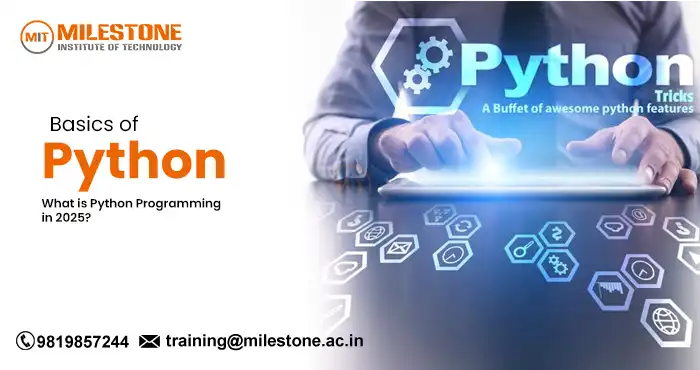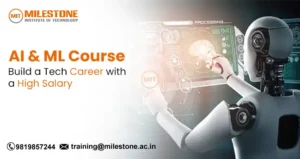
Basics of Python
Python is one of the most popular programming languages in the world. Its simplicity and versatility has made it the favorite for both professionals and beginners. Whether you’re just dipping into the world of programming or you’re a well-seasoned developer looking to add another language to your tool belt, python is a great choice.
In this blog we will study What is python programming, Why Python programming becoming popular and start learning python basics to start your journey.
What is Python Programming?
Python is an interpreted, high-level, and general-purpose programming language created by Guido van Rossum and first released in 1991. It’s focused on readability and simplicity, which means you can write more sophisticated programs using fewer lines of code compared to other languages as C++ or Java. Python is a multi-paradigm language, with support for several programming styles including procedural, object-oriented, and functional. Python is really good at some of those things, web development, data analysis, artificial intelligence and machine learning only begin to scratch the surface of what can be achieved with python in various sectors and areas. This versatility means that knowing basics of python can open doors to many different kinds of jobs today.Why Learn the Basics of Python?
Here are a few reasons why python is the programming language of choice for beginners:- Simple Syntax: It’s simplicity in syntax, as well as readability, makes it simple for anyone who can read English to learn the python language, and this reduces the cost of program maintenance.
- Large community support: A huge global community means you will never be short of assistance, tutorials and libraries to accompany you on your learning journey.
- Versatile Applications: From automation scripts to complex data pipelines, python is used everywhere.
- Strong Job Demand: You are able to pick up career in web development, data science, AI, cybersecurity and others job.
Basics of Python Explained with Simple Examples
You don’t have to be a computer specialist to understand the basics of python. So, let’s take a look at some easy and everyday examples to see how python works in an extremely beginner-friendly manner.Giving Instructions
Imagine yourself explaining to someone how to make a cup of tea. You might say:- Boil water
- Add a tea bag to a cup
- Pour the water into the cup
- Add sugar or milk if you like
Giving Instructions to Computer Using Python
This is the step-by-step sequence is what python tells a computer to do. In python, every step is written down so the machine can execute it without getting confused.- Let’s take an variable named “a” with value 1 : a = 1
- Let’s take another variable named “b” with value 3 : b = 3
- Now we will add both of these variable using + (Addition Operator) : a + b
- And assign these values to variable names “Sum” : Sum = a + b
- Now we will print the output using python print built-in function : print(Sum)
Using Variables
Think of a variable as being a box. Suppose, if you have put sugar into a jar and it’s labeled “sugar” anyone can know what’s inside by reading. the jar is your variable and the variables operate exactly the same in the basics of python.They store information, such as numbers, names or any other data. for example, you’ll be able to save your age or your favorite color and refer to it later.
Repeating Tasks
Have you ever done laundry or packed school bags? You typically repeat the same action numerous times. This is called a loop, in python terms doing something again and again until a condition is satisfied. It’s one of the basics of python and comes in handy if you ever need to repeat a set of instructions, such as sending mass birthday greetings to friends.Organizing Information
Let’s say you have a grocery list of milk, bread and eggs. python can save these type of lists and handle them, which will always be useful in order to structure information. Being part of the basics of python, you will learn to work with lists and other types of data to keep things organized, nice, and accessible.Asking for Input
Python can also interact with users. Just imagine a vending machine asking you to enter a number for the item you want. Similarly, python can be written to ask questions and answer on basis of your answer. This interactive feature is introduced right in the beginning of the basics of python.Real-World Uses of Python
To understand why you should learn the basics of python, here are some real-life uses for python:- Websites: Major website platforms such as Pinterest and Instagram rely on python for their server-side development.
- Banking & Finance: Python is the tool for automation of reports and processing of financial data.
- Health care: It aids in analyzing medical records and maintaining patient data.
- Education: Python is commonly taught in schools and universities as it is an easy language to learn.
- Everyday Chores: You can automate easy things like file renaming or image sorting with Python.
Tips for Learning the Basics of Python Effectively
- Keep on Practicing: Practice is the best teacher to learn coding. Do some little exercises every day.
- Build Projects: You Should work on mini projects like a calculator, to-do list or quiz app to implement the concepts.
- Join Python Communities: Don’t forget to be active in the community like Stack Overflow or Reddit in order to keep the motivation high.
Conclusion
Python is a perfect programming language for beginners because of its clean syntax, readability and A+ support community. Learning the basics of python can mark the beginning of an incredible journey that can lead to interesting job opportunities in tech, automation, data science, and a lot of other fields! With regular practice and a healthy dose of curiosity, you can go from copying and pasting your first lines of code to crafting full-blown applications in no time. If you are serious about picking up programming, don’t delay. Begin learning basics of python today and become fluent in the language of the future.



